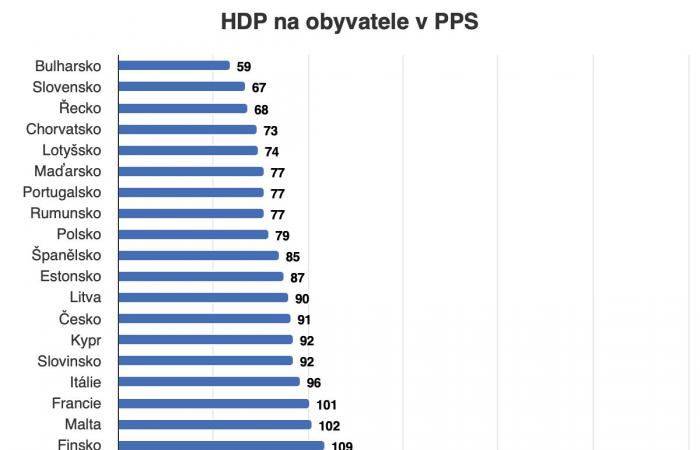The wealth of Czechs in the EU increased by more than 40 percent over a period of 20 years, despite the worse results of the last three years. In conversion, it thus surpassed countries such as Greece, Portugal or Spain. However, the rate of growth is not the same in all Czech regions. In the Karlovy Vary and Ústí Region, the standard of living grew more slowly compared to the rest of the country.
From the long term analysis of Česká spořitelna it follows that the Czech Republic has improved significantly thanks to its membership in the European Union. The standard of living of the Czechs has come close to the countries of Western Europe, now it is 90 percent of the European average, while twenty years ago it was 80 percent. Average household consumption increased by 22 percent during that time.
However, the rate of economic growth is not uniform in the Czech Republic, it varies across regions. “Overall, the Czech Republic is getting closer to the average standard of living of the EU, but some regions are moving further away. Specifically, in the Karlovy Vary and Ústí Regions, the standard of living has grown more slowly since joining the EU than in the remaining regions and compared to the EU average. The standard of living rose the most among the Czech regions in the South Moravian region,” he said David Navratilchief economist of Česká spořitelna.
As for the Czech Republic as a whole, the rise in living standards in recent years has been complicated by the covid-19 pandemic. During 2022, the standard of living decreased in almost all regions. “The only exception was the region of Central Bohemia, which remained unchanged. The overall standard of living in the Czech Republic dropped from 92 to 90 percent of the EU average,” she pointed out Tereza Hrtúsová, analyst at Česká spořitelna. According to economists, the Czechs have suffered the most from European countries over the past three years.
Minister of Finance Zbyněk Stanjura (ODS) but assumesthat the situation will improve during this year. “Wages in the private sector are growing faster than we estimated. Unemployment is slightly lower than we predicted at the beginning of the year. All this has positive effects,” he argued.
If the Czech Republic were not part of the EU, it would fare significantly worse economically, the analysis claims. For example, GDP per capita would be a fifth lower than last year, and household consumption would then decrease by a third.
2 trillion crowns in 20 years
What is behind the mentioned difference between the regions? According to Tereza Hrtúsová, the way in which the regions draw the funds available from the Union funds has its share in this. “Some regions may have better and more efficient systems for the preparation and implementation of projects financed from EU funds, which allows them to get more support for investment and development,” said the analyst for the Euractiv.cz server. Another reason for the gap is the structure of the economy, some regions are simply more attractive to investors than others.
As for the Czech Republic as a whole, the figures show that EU money has contributed to its development. According to Hrtúsová, European support has an effect on the development of infrastructure, increasing the competitiveness of the Czech economy, but also on the development of regions. Cohesion funds represent 40-50 percent of public investments. “Without this support, many of them would not have been created,” the analyst pointed out.
Approximately 70 billion crowns will flow to the Czech Republic from the European budget every year, which is more than the annual budget of most ministries. For twenty years, the Czech Republic received membership from European sources almost two trillion crowns. During the same period, it contributed 876.6 billion crowns to the budget.
The Czech Republic is therefore still a net recipient of EU money – that is, it receives more money from the EU budget than it contributes itself. But that may change in the coming years. However, a prerequisite for such a change is the continued approximation of the Czech Republic and its regions to the EU average.
“However, according to current data, most regions and the Czech Republic as a whole are moving away from this average. The date when the Czech Republic becomes a net payer will therefore depend on how quickly the economy and individual regions can be ‘started’ again. Given the current development, I estimate that we will remain net beneficiaries for the entire program period 2028+,” estimates Hrtúsová.
What will affect the future of the Czech economy?
The Czech Republic is in the ranking published by the statistical office Eurostat in the standard of living category, it is roughly in the middle. It surpassed countries such as Greece, Portugal or Spain and approached the standard of living of Italians. Luxembourg and Ireland lead the ranking, while Bulgaria and Slovakia are on the imaginary tail.
As the published analysis of Česká spořitelna points out, even if the Czech Republic is not doing badly, some countries that also joined the EU in 2004 were able to grow faster. The biggest jump in this regard was made by Lithuania, which went from 43 percent to 90 percent of the EU average. Cyprus and Malta also achieved better results. The second mentioned country has a standard of living comparable to France.
“Although the development of the Czech GDP currently remains subdued, there should be a gradual improvement from the second half of this year. A significant improvement should then occur next year. However, it will depend to a large extent on the development of the German economy,” mentioned Hrtúsová.
In general, the future of the Czech economy will depend on its ability to respond to green and digital transformation. According to estimates, this will cost the Czech Republic approximately two trillion crowns by 2030. Part of them should come again from European sources, for example from the REPowerEU plan. According to analysts, another no less important topic will be the eventual adoption of the euro.
Tags: membership standard living Czechs closer countries Western Europe EURACTIV .cz
-






